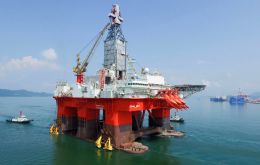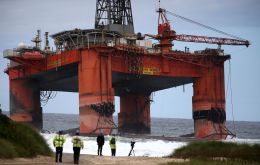MercoPress. South Atlantic News Agency
Energy & Oil
-
Monday, November 9th 2020 - 09:21 UTC
Petrobras expects increased production from the pre-salt offshore basin

By Tsvetana Paraskova for Oilprice.com – Because of the increased production at the prolific pre-salt offshore basin, Petrobras expects its oil and gas production this year to exceed earlier guidance, Brazil’s state oil firm said when it reported its production figures for Q3.
-
Saturday, November 7th 2020 - 08:40 UTC
Four days blackout in Brazilian Amapa state: full service restoration in ten days

A fire at an electricity substation has caused four days of blackouts in most of northern Brazil’s Amapa state, disrupting the lives of hundreds of thousands of people.
-
Thursday, November 5th 2020 - 09:32 UTC
Chilean mining industry lobby cautions about the rewriting of the new constitution

Chile’s world-leading copper industry will see investment lag for at least two years as the country rewrites a constitution that underpinned nearly three decades of mining growth in the South American nation.
-
Wednesday, November 4th 2020 - 09:35 UTC
Peru with Canadian funds joins the South American lithium rush

Canada’s Plateau Energy Metals has raised nearly US$ 600 million to develop Peru’s sole lithium project and expects to start mining in 2023, a year later than planned, as the country lags its neighbors in developing the battery mineral, a company official said.
-
Monday, November 2nd 2020 - 09:02 UTC
A quarter of global floater segment faces scrapping, according to Rystad Energy

One-quarter of the global floater (offshore drilling rig) segment could be scrapped. That’s according to Rystad Energy, which outlined that restructuring in the “already stretched” offshore drilling market will accelerate.
-
Friday, October 30th 2020 - 09:37 UTC
Brazil keeps interest rate at record low, despite a spike in food and fuel inflation

Brazil’s central bank kept its key interest rate at a record-low 2.00% on Wednesday, maintaining its “forward guidance” pledge to keep rates lower for longer and even the possibility of further easing, despite the recent rise in inflation and fiscal risks.
-
Thursday, October 29th 2020 - 08:28 UTC
Petrobras cutting losses as Brazilian economy and fuel demand are increasing

Brazil's state-run oil giant Petrobras announced on Wednesday it reduced its losses in the third quarter of the year, the company's third negative result in a row due to the global economic meltdown caused by the coronavirus pandemic.
-
Wednesday, October 28th 2020 - 09:25 UTC
Brazil third largest supplier of crude oil to China during September; Russia leads

Data from the Chinese Customs Administration indicates that in September, Brazil advanced to the position of third-largest supplier of crude oil to the Asian country, as independent Chinese refiners obtain cheap and a relatively high-quality supply from the South American exporter.
-
Wednesday, October 28th 2020 - 09:23 UTC
Huge volumes of discovered hydrocarbons remain 'stranded' in South Atlantic fields of Brazil, Angola and Falklands

Huge volumes of discovered hydrocarbons worldwide are currently ‘stranded,’ according to a study by Westwood Global Energy Group. The consultant has identified 119 fields in this category that were found between 2008 and 2016 with collectively 11 Bbbl of oil and 36 Bboe of gas, but currently not progressing toward development, including Brazil, Angola, and the Falkland Islands in the south Atlantic.
-
Wednesday, October 28th 2020 - 09:06 UTC
Guyana extends Noble Corporation drillship rig contract 6,5 years to August 2030

Noble Corporation plc's ultra-deepwater drillship Noble Tom Madden has received about 6.5 years of additional contract term under the commercial enabling agreement (CEA) with ExxonMobil for work offshore Guyana.
